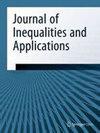Error analysis for l q
IF 1.6
3区 数学
Q1 Mathematics
Journal of Inequalities and Applications
Pub Date : 2018-01-01
Epub Date: 2018-09-25
DOI:10.1186/s13660-018-1856-y
引用次数: 0
Abstract
We consider the moving least-square (MLS) method by the coefficient-based regression framework with -regularizer and the sample dependent hypothesis spaces. The data dependent characteristic of the new algorithm provides flexibility and adaptivity for MLS. We carry out a rigorous error analysis by using the stepping stone technique in the error decomposition. The concentration technique with the -empirical covering number is also employed in our study to improve the sample error. We derive the satisfactory learning rate that can be arbitrarily close to the best rate under more natural and much simpler conditions.
q系数正则化移动最小二乘回归的误差分析。
采用基于lq -正则器(1≤q≤2)和样本相关假设空间的系数回归框架来考虑移动最小二乘(MLS)方法。新算法的数据依赖特性为MLS算法提供了灵活性和自适应性。我们在误差分解中采用了阶梯形技术进行了严格的误差分析。为了提高样本误差,本研究还采用了经验覆盖数为12的浓缩技术。在更自然和更简单的条件下,我们推导出满意的学习率,它可以任意接近于最佳速率O (m - 1)。
本文章由计算机程序翻译,如有差异,请以英文原文为准。
求助全文
约1分钟内获得全文
求助全文
来源期刊

Journal of Inequalities and Applications
MATHEMATICS, APPLIED-MATHEMATICS
CiteScore
3.30
自引率
6.20%
发文量
136
审稿时长
3 months
期刊介绍:
The aim of this journal is to provide a multi-disciplinary forum of discussion in mathematics and its applications in which the essentiality of inequalities is highlighted. This Journal accepts high quality articles containing original research results and survey articles of exceptional merit. Subject matters should be strongly related to inequalities, such as, but not restricted to, the following: inequalities in analysis, inequalities in approximation theory, inequalities in combinatorics, inequalities in economics, inequalities in geometry, inequalities in mechanics, inequalities in optimization, inequalities in stochastic analysis and applications.
 求助内容:
求助内容: 应助结果提醒方式:
应助结果提醒方式:


